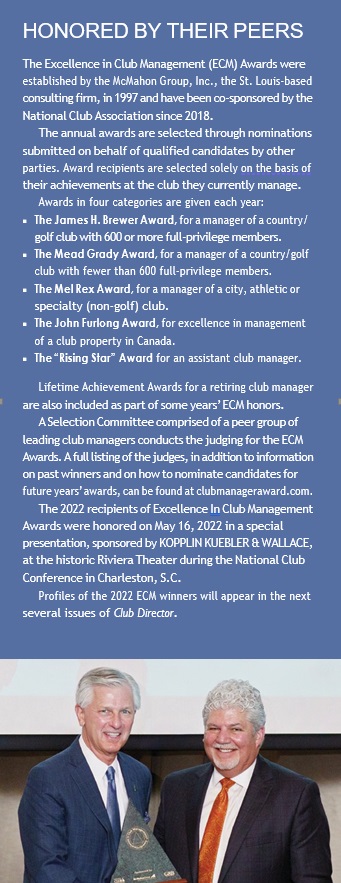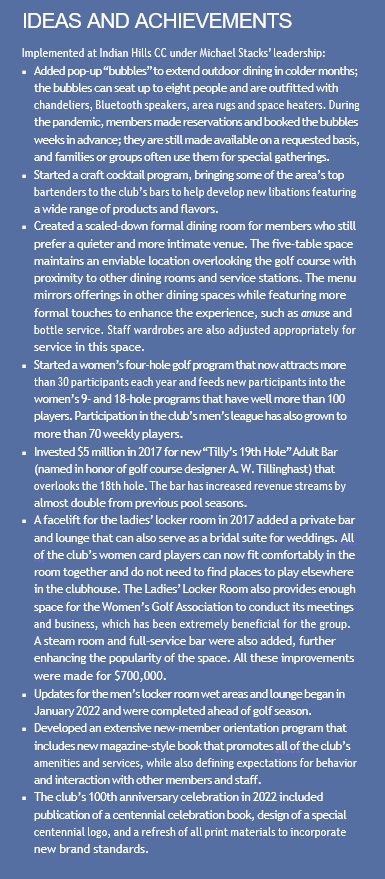The club industry is not immune from career volatility for even the most accomplished managers, with the resumes of many top GMs including a series of hops, skips and jumps as they seek to find a place that provides professional security and satisfaction. But examples can be found that prove reaching that goal doesn’t have to be a case of chasing an ever-moving target.

After graduating from Oklahoma State University’s Hotel & Restaurant Administration program and spending 10 years at a series of hotel and resort properties in the Virgin Islands, Michael Stacks shifted to private club management in search of more stability. He took positions at a variety of clubs—including Franklin Hills Country Club, Huron River Hunting and Fishing Club and Bloomfield Open Hunt, an equestrian and tennis club— in Michigan, and then became general manager of Gaillardia Golf & Country Club in Oklahoma City, Okla.
In 2002, the road led to his taking the position of general manager/COO of Indian Hills Country Club in Mission Hills, Kan. Stacks remained at Indian Hills for 20 years and worked with a new board president for each of them—defying the added difficulties of one-year terms that many see as the root cause of many GMs’ moves. Over that time, he helped to steer the club through a series of challenges and to impressive new levels of growth and accomplishments (see “Ideas and Achievements).
In a serendipitous convergence with Indian Hills’ 100th anniversary year, Stacks’ steady contributions to the club’s success during the most recent one-fifth of its history then culminated with his selection by a peer group of managers for The Mead Grady award, as part of the 2022 Excellence in Club Management® (ECM) Awards co-sponsored by the McMahon Group and National Club Association (see sidebar, right).
The Right Fit
Stacks did announce this fall that he would be leaving Indian Hills to take a new position (see Editor’s Note, pg. 21). But after finding and following a career straightaway for the last two decades at Indian Hills, he doesn’t feel his particular track record reflects any special ability to navigate or avoid the usual curves and detours.
“It’s a matter of finding a place that fits you and your management style,” he said. “I was blessed to have 20 really great presidents at Indian Hills, and that’s what keeps you there.”
“Communication is everything,” Stacks continued. “You have to let the president and executive committee know about everything, so they learn to trust that you’ve got things handled and they’re not going to be surprised when a member approaches them on the driving range or in the clubhouse about something they haven’t heard about. There are issues that come up every single day, and whether they’re minor or major, your presidents need to know about them, so they can be confident they’re prepared to answer any questions when they walk anywhere in the club. That’s what’s worked for me, and the philosophy I’ve carried through all my years.”
In nominating Stacks for ECM honors, Robert Owens, the current president of Indian Hills’ board of governors, credited him with “establishing
an inviting and engaging leadership style [that] promotes and sustains” the club’s “culture of courtesy.” Stacks also instituted “a more engaged culture for members and employees alike,” Owens added, “creating programs to enhance member feedback and empower member committees, [and leading] initiatives to set clear goals and objectives for each committee.” All of this, Owens said, has made Indian Hills a place where “people want to be members,” as evidenced by its “burgeoning waiting list of new candidates hoping to gain membership.”
The engagement level of the Indian Hills staff is reflected by the long tenures of many key department heads and employees Stacks led since his arrival in 2002. Most notably, Golf Professional Mike Ricket started there as an assistant pro in 1982 before becoming the head pro four years later.
Staying Out in Front

Mission Hills, Kan., has a population of just more than 3,500, but the Kansas City suburb is home to several well-respected clubs that are all in high demand. Being in that kind of market, Stacks says, always made him stress to his team that “We don’t want to just keep up with the Joneses—we want to be the Joneses.”
Following that mantra led Stacks to help push through a $12 million clubhouse renovation in 2009, when the Great Recession caused many clubs to put capital projects on ice. The renovation gave Indian Hills a leg up on attracting large events with the addition of a ballroom and associated banquet spaces and expansion of the kitchen; the club now has the capacity to host gatherings of more than 500 people while still retaining enough clubhouse space and kitchen capacity to avoid any effect on regular member dining.
The Indian Hills renovation included a significant focus on outdoor dining well before that became a sweeping trend. The patio was expanded to seat more than 150, and a wood-burning fireplace with soft seating and outdoor bar with TVs were added, allowing the club to fully showcase its golf course vistas.
Indian Hills saw an immediate boost in outdoor covers from the project that continued to gain momentum year after year. That success led to the addition in 2017 of a new adults-only bar and 19th hole venue overlooking the 18th green that is also equipped with a fireplace and includes outdoor seating for another 50 people.
All of this proved to be extremely prescient when the pandemic hit and Indian Hills saw its banquet business, which accounted for half of its total food-and-beverage revenues, take a $1 million hit in 2020. But with already a decade of experience with high-volume outdoor service, the club was well-prepared to pivot to provide safe and efficient dining. It set à la carte records while also generating new revenue streams through grocery programs, increased curbside to-go offerings and made up the entirety of 2020’s $500,000 loss in F&B by the end of 2021.
“Michael’s effective style was never more evident than his deft navigation of the ever-changing pandemic challenges,” Robert Owens wrote in his ECM nomination. “He established innovative programs and employee engagement measures to successfully maintain member satisfaction and service-delivery standards.
These enhancements were accomplished under extraordinary circumstances, with safety and experience for his staff and the membership always foremost in consideration.”
Learning from the Masters
Indian Hills CC also benefitted from experience Stacks gained and lessons he brought back and implemented, from what’s universally recognized as the Joneses everyone in the industry strives to keep up with: Augusta National Golf Club during the Masters tournament.
Stacks first got the opportunity in 2015 to be among the group of GMs from around the country to travel to Augusta to help with tournament operations, and he’s returned every year since, except when the pandemic interrupted the schedule.
“I get to help run the Founders’ Room, where members’ and players’ dining takes place,” he said. “It’s the only room where breakfast, lunch and dinner are all served [during the tournament], and it requires two shifts and over 30 people on the staff.
“It’s a lot of work but certainly a great experience,” he added. “We’re helped by hospitality students from the University of South Carolina, and I tell them each year, ‘Forget everything you think you already know—this will be the hardest thing you’ve ever done, but if you do it well, you’re going to benefit for the rest of your life from how you’ll learn to serve some of the most prominent and gracious people in the world.’”
Indian Hills members and staff benefited for the rest of each year from the new ideas and techniques Stacks continued to bring back from each of his Masters experiences. “Every time I go back to Augusta, there’s something new—a new building or underground tunnel, or a new approach they’ve come up with to improve efficiencies and the experience,” he said. “That’s shown me that if you can think it, it can probably get done, no matter where you are. And it helped me keep pushing to find new ways to continue to improve both the facilities and experiences at Indian Hills.
“It also helped me to refine and continue to try to perfect our service mentality, too,” Stacks added. “It’s all about eye contact and smiling and being courteous, and creating a culture that everyone buys into and that makes those things second-nature.
“We hired someone whose main job is hospitality training, not only for F&B, but the entire club,” Stacks said. “That’s key to keeping a culture and vision consistent. We sold our staff on how they’re working for some of the top entrepreneurs, doctors and lawyers, and how they do so in a workplace that has great views and lets you play golf on Mondays. “We changed our philosophy and training to focus on providing experiences that not only become the best part of a member’s day, but the best part of an employee’s day, too,” Stacks said. “When you can establish that as something that’s felt by everyone throughout the entire club, the first day of work is every day, and 20 years will go by like that.
Joe Barks is club communications director with McMahon Group. He can be reached at [email protected].


